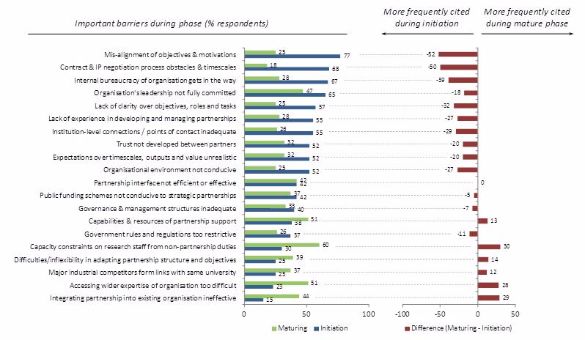BLOG: How can we develop effective and mutually beneficial strategic university-industry partnerships?

Are you involved in strategic university-industry partnerships? Contribute to our research by completing this short questionnaire.
Mounting evidence suggests that many large research-intensive firms have been rationalising their investments in universities to focus on a core set of longer-term, strategic partnerships with a more selective group of universities and curtailing the number of non-core universities with which they engage. Worryingly for UK and US universities, these high-value, long-term investment decisions are becoming increasingly global as opportunities and capabilities build in key emerging economies.
What more can universities and companies do to develop effective and mutually beneficial strategic partnerships? A report by Tomas Coates Ulrichsen and Eoin O’Sullivan at the Centre for Science, Technology and Innovation Policy (CSTI) at the IfM focuses on this important question. It highlights the importance of these types of partnership in unlocking significant additional value from university-industry interactions for each partner involved. It brings together key lessons and effective practices emerging from a major 2014 US/UK workshop, which brought together 70+ senior thought leaders from UK/US universities and multinational firms involved in developing these types of partnerships.
Core principles for building sucessful institutional strategic partnerships
Successful strategic partnerships appear to be built on the following core principles:
- Ability for each partner to unlock significant benefits through the relationship
- Alignment of interests, expectations and objectives recognising the intrinsic differences between industrial partners and universities
- Strong commitment and desire to engage, from the critical decision makers to the researchers on the ground
- Willingness to learn, adapt and experiment with new ways of working at together, and with pathways to transfer and exploit knowledge and technologies
- Building of deep, trusting relationships at different levels of the organisations
- Openness, transparency and effective communication
It must also be noted that the full value realised through strategic partnerships can take time to emerge and may only do so after a certain threshold of trust and depth of relationship has been developed. Examples were provided by industry delegates of cases where they did not know from the outset what the most important research questions were or how they could benefit most from the advances in knowledge being produced within the research base. This only emerged following strong and deep dialogue with their trusted academic partners.
Strategic partnerships must adapt to survice: flexibility and learning is critical
However, strategic partnerships must be able to adapt to survive and succeed. They have to overcome a range of transactional, motivational, relational, capacity and organisational challenges which evolve as partnerships mature (Exhibit 2).
Exhibit 2: Rank order of challenges facing strategic partnership development during initiation and when mature (% respondents to workshop survey)
These challenges go well beyond the much publicised difficulties associated with contracts and IP negotiations. Indeed once these issues have been dealt with during the setup phase, other more relationship and capacity-related factors typically emerge that have to be overcome to realise value. There are also a number of barriers that appear to persist including: the ongoing commitment of leadership; unrealistic expectations over timescales, outputs and value; and the suitability of public funding to support partnership activities.
Strategic partnerships therefore need the flexibility to adapt and must be willing to learn both from others and from their own experiences about how to improve. In addition, a willingness to experiment to explore new ways of working is important for finding ways to transfer the knowledge back into the company to be commercially exploited.
Partnerships also need to be proactively managed and supported, and this requires dedicated resources to be devoted to the partnership on both sides. Delegates also highlighted the value of having individuals who were able to effectively span boundaries, not just between the university and the company, but critically back into their own organisations.
The report highlights a wide range of other practical insights and lessons drawing on delegates’ experiences to help make strategic partnerships work during the initiation phase; managing them; and dealing with disruptions and change.
Strategic partnerships are hard to secure, setup and manage, and not all relationships should become strategic but, if successful, can unlock significant benefits for all parties involved.
The workshop was organised by CSTI in partnership with the US-based University-Industry Demonstration Partnership, PraxisUnico and the UK government’s Science and Innovation Network USA.
Are you involved in strategic university-industry partnerships? Contribute to CSTI’s research by completing this short questionnaire!
The workshop provided a wealth of evidence on what more can be done to build effective and mutually beneficial strategic partnerships. However, important questions remain.
- How do these types of partnerships contribute to the innovation activities of firm and to the universities involved?
- What factors influence university partner choice?
- What types of university support are required beyond contracts and IP?
- What challenges need to be overcome as partnerships mature?
Answers to these questions will help us to develop more robust frameworks for examining and developing the value proposition, and inform how partners can strengthen their approaches for securing and developing these types of partnerships.
Help us to kick start the next phase of our research by completing this short questionnaire. All responses will be kept strictly confidential.
Thanks to all those who have completed it so far!
For further information contact Tomas Coates Ulrichsen (tc267@cam.ac.uk).
This blog was originally posted on the Foreign and Commonwealth Office website.











